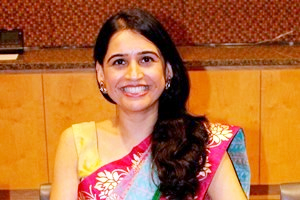About Priya Naik
Samhita was founded in 2009 when few companies were engaged in corporate philanthropy and still fewer were strategic about it.
Samhita’s aim was to attract not just philanthropic money from the corporate sector but to leverage its various attributes and to help it create real partnerships with the social sector.
However, its activities have a much wider scope than corporate philanthropy. In addition to running companies’ CSR programmes – it does everything from devising strategy to stakeholder engagement – Samhita increasingly convenes multi-stakeholder partnerships, bringing together organizations from all sectors on issues such as water and sanitation, healthcare and energy access, in order to deploy the skills of the different sectors to achieve development goals efficiently.
In her own words…
‘Samhita came about following a conversation I had with one of the co-founders of Infosys, who ended up funding us.
We agreed that while there were different actors in the development sector, corporate India was not a key participant, so Samhita was established to engage companies more effectively and more strategically. We were agnostic about how companies should
engage.
The key thing was whether we were able to convince them to offer financial resources and technical expertise to solve problems in ways that only they could.
As we began working with companies, we realized that they were looking at development sector problems through the lens of their product, their geography, their stakeholders, which is not helping you solve systemic problems at scale; it’s only helping you solve slices of something more complex.
Increasingly, therefore, we now function as a backbone entity that creates platforms for multi-stakeholder collaborations, and works with funding and implementation organizations to plug the various knowledge and capacity-building gaps that exist in the Indian social sector ecosystem.
For example, we are working closely with the government of Maharashtra on water and sanitation. It has the budget to create the infrastructure, but not the technical expertise to address challenges of maintenance or behaviour change. So we asked them, “Which big gaps can companies address either through a financial contribution or their competencies?”
Apart from water and sanitation, we have platforms in nutrition, social entrepreneurship and clean energy.
The next thing we want to do is to demonstrate that these collaborative approaches create greater impact than people doing it on their own and to attempt to standardize and codify them into templates for collaboration.
Bringing all these differentstakeholders together in a way that they will continue working with or without us, and creating a strong value proposition along the way is still a work in progress.
What’s difficult is that, when you talk about bringing people together, it seems fairly simple but, often, it doesn’t work for any number of reasons and funders don’t have the flexibility or the patience to allow you to experiment. They want to solve big problems in exciting, innovative ways but they don’t have the patience to support you through that process.
I find that failure in the social sector is unwelcome, whereas in the entrepreneurial ecosystem, failure is tolerated, even desired. Those are the battles we find ourselves fighting.
What’s more, in India, unlike Europe and the US, the philanthropy ecosystem is not well developed.
For us to create a large-scale collaboration around water and sanitation or nutrition, the knowledge base around that particular cause needs to be robust and it’s not.
There are many other organizations working in Indian philanthropy but we have neither a common networking platform nor a common taxonomy.
Along with our partners and funders, we are committed to addressing challenges of each player in the Indian social sector ecosystem to ensure self-sufficiency, sustainability and depth of impact.’
The Olga Alexeeva Memorial Prize is organized annually by Alliance magazine, in association with Charities Aid Foundation, Charles Stewart Mott Foundation, Philanthropy for Social Justice and Peace and Vladimir Potanin Foundation.
You can learn more about the Olga Alexeeva Memorial Prize here.







Comments (0)